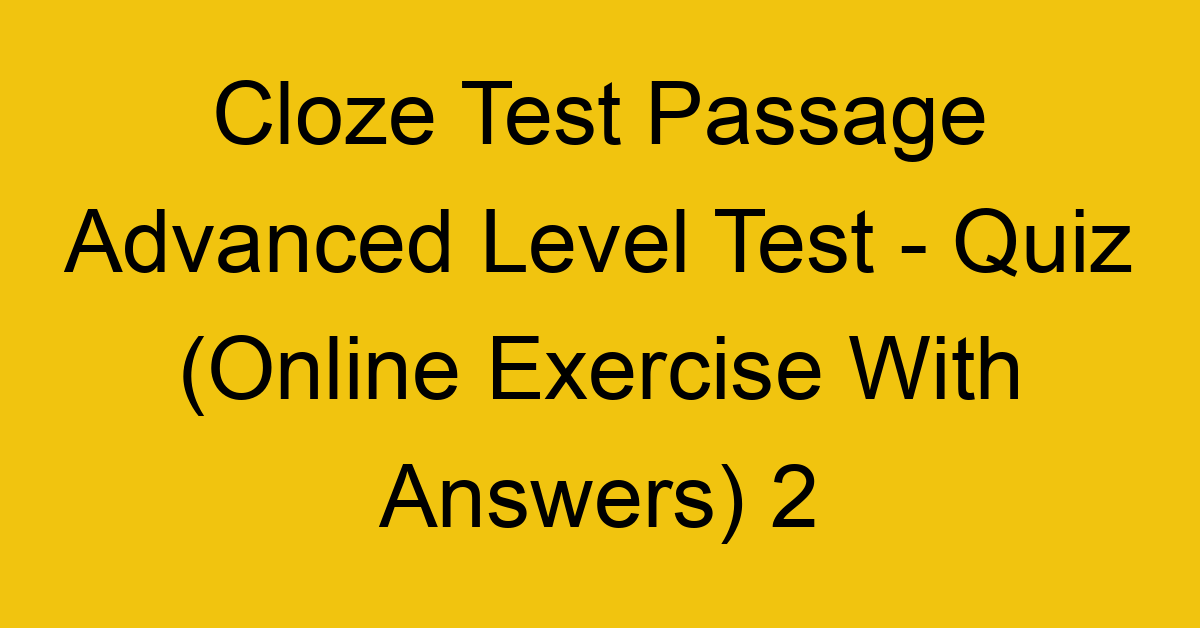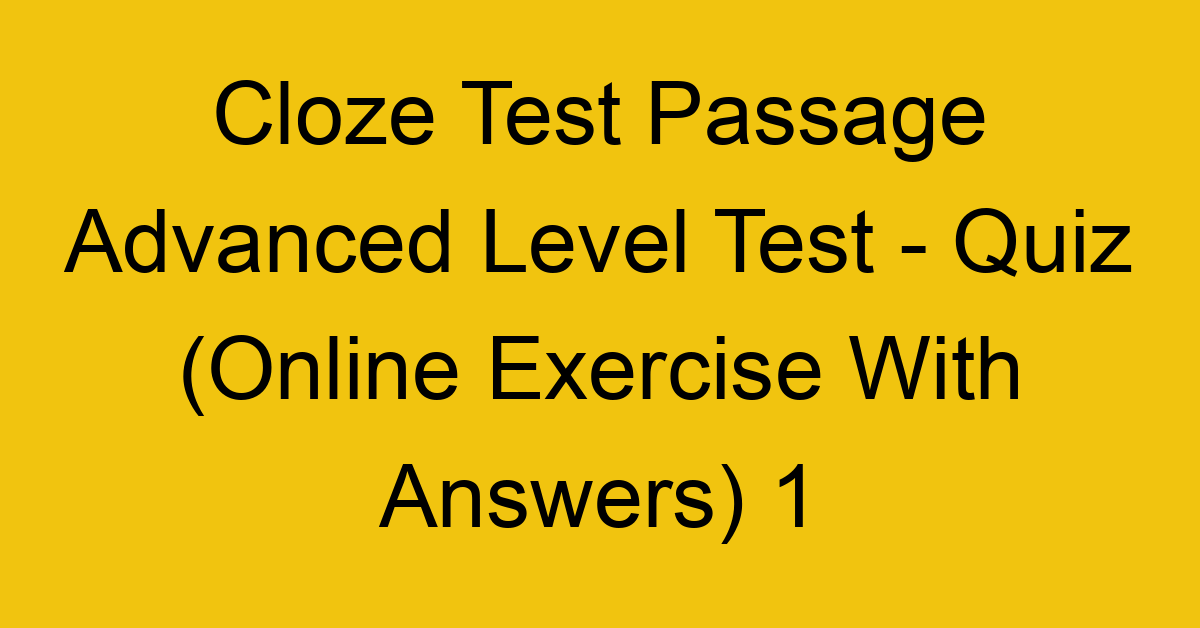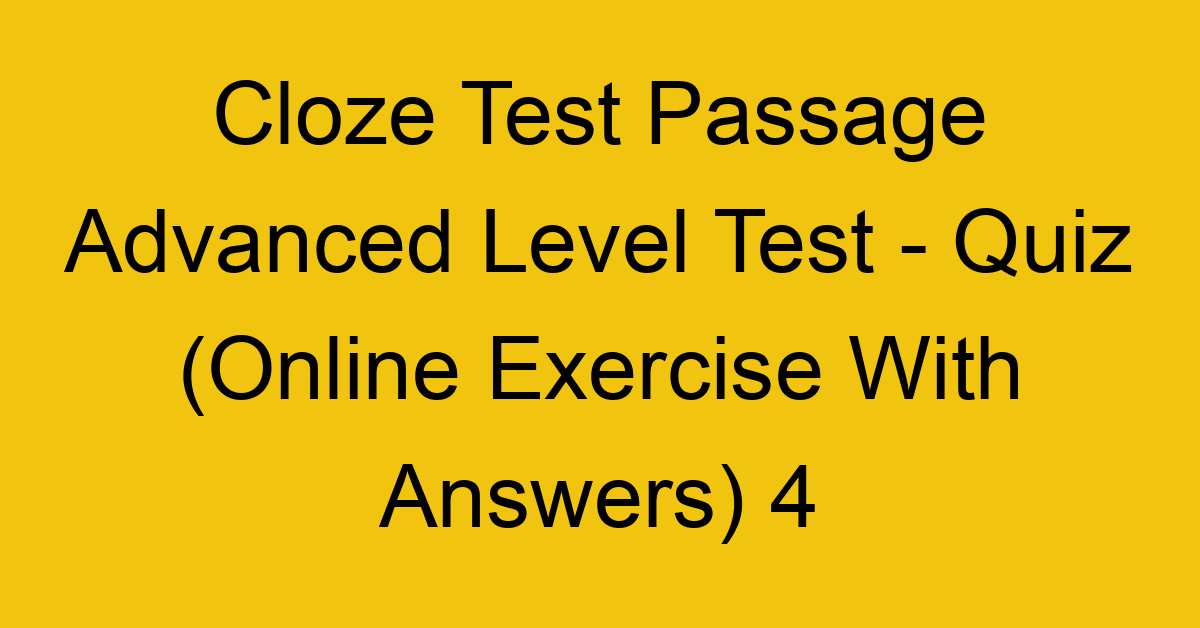This third cloze test contains 30 multiple choice questions on the topic of cloze test passage of English language. Both English learners and ESL teachers can use this online exercise as a revision to check the knowledge of cloze test.
Cloze Test Passage Advanced Level Test 3
Question 1 |
(Please note: The following questions are part of a cloze test. They are interrelated, meaning that the information provided in each question is connected to the others.)
Myths may play a critical role in _____ a culture constructs its sense of time.
A | that |
B | how |
C | what |
D | whose |
E | whom |
Question 2 |
In _____ sense, myths are contrasted to history, which concerns well _____ events.
A | this |
B | those |
C | the |
D | many |
E | little |
Question 3 |
In _____ sense, myths are contrasted to history, which concerns well _____ events.
A | thought |
B | considered |
C | documented |
D | regarded |
E | approved |
Question 4 |
A myth, however, is generally a story that takes _____ in an imagined, remote, timeless past and _____ of the origins of humans, animals and the supernatural.
A | part |
B | over |
C | through |
D | with |
E | place |
Question 5 |
A myth, however, is generally a story that takes _____ in an imagined, remote, timeless past and _____ of the origins of humans, animals and the supernatural.
A | says |
B | tells |
C | gossips |
D | sounds |
E | prepares |
Question 6 |
(Please note: The following questions are part of a cloze test. They are interrelated, meaning that the information provided in each question is connected to the others.)
When Maria Montessori was born in Italy in 1870, her future seemed certain. Women did not have careers in those days, _____ did they attend college.
A | as |
B | and |
C | only |
D | nor |
E | like |
Question 7 |
People generally believed that women were not very intelligent and not capable _____ complex thought.
A | of |
B | with |
C | at |
D | on |
E | in |
Question 8 |
So Maria, it seemed, had little _____.
A | perspective |
B | intelligence |
C | choice |
D | personality |
E | thought |
Question 9 |
______ her mother and most of the other women, she would become a mother.
A | Like |
B | So |
C | For |
D | By |
E | Such |
Question 10 |
She did, in fact, became a mother, but _____ her life took a very different course. She became a doctor - the first woman doctor in Italy.
A | instead of |
B | on the contrary |
C | in view of |
D | otherwise |
E | similarly |
Question 11 |
(Please note: The following questions are part of a cloze test. They are interrelated, meaning that the information provided in each question is connected to the others.)
Many tumour markers have been found that looked promising at the time. Unfortunately, most of them have turned out to be ______ good at detecting cancer in its early stages ______ a handful have proved useful for helping doctors _____ a cancer patient's response to _____, as well as giving some indication of recurrence.
A | any |
B | no |
C | much |
D | many |
E | very |
Question 12 |
Unfortunately, most of them have turned out to be ______ good at detecting cancer in its early stages ______ a handful have proved useful for helping doctors _____ a cancer patient's response to _____, as well as giving some indication of recurrence.
A | if |
B | thus |
C | likewise |
D | because |
E | though |
Question 13 |
Unfortunately, most of them have turned out to be ______ good at detecting cancer in its early stages ______ a handful have proved useful for helping doctors _____ a cancer patient's response to _____, as well as giving some indication of recurrence.
A | monitoring |
B | monitored |
C | to have been monitored |
D | monitor |
E | be monitoring |
Question 14 |
Many tumour markers have been found that looked promising at the time. Unfortunately, most of them have turned out to be ______ good at detecting cancer in its early stages ______ a handful have proved useful for helping doctors _____ a cancer patient's response to _____, as well as giving some indication of recurrence.
A | fear |
B | physiology |
C | examination |
D | diagnosis |
E | treatment |
Question 15 |
At present, the only marker _____ used in early cancer detection is PSA. Now a standard test for prostate cancer can't be thought of without PSA.
A | widely |
B | never |
C | hardly |
D | sometime |
E | once |
Question 16 |
(Please note: The following questions are part of a cloze test. They are interrelated, meaning that the information provided in each question is connected to the others.)
"Egyptomania" is a new art exhibition, ______ has opened at the Louvre Museum in Paris.
A | when |
B | where |
C | that |
D | who |
E | which |
Question 17 |
It shows just how ______ images of Egypt have emerged through the ______ and examines why this ancient culture has continued to have such a powerful influence _____ the Western imagination.
A | much |
B | lot of |
C | many |
D | every |
E | each |
Question 18 |
It shows just how ______ images of Egypt have emerged through the ______ and examines why this ancient culture has continued to have such a powerful influence _____ the Western imagination.
A | periods |
B | age |
C | times |
D | history |
E | year |
Question 19 |
It shows just how ______ images of Egypt have emerged through the ______ and examines why this ancient culture has continued to have such a powerful influence _____ the Western imagination.
A | on |
B | in |
C | at |
D | about |
E | for |
Question 20 |
It ____ five years to prepare the exhibition, which includes more than 300 items, many of them on loan from international museums.
A | was |
B | needed |
C | used |
D | took |
E | consisted |
Question 21 |
(Please note: The following questions are part of a cloze test. They are interrelated, meaning that the information provided in each question is connected to the others.)
There is ______ that pleases the sporting public more than seeing an old champion they once _____ adore coming back after _____ and reviving memories of _____ victories.
A | anything |
B | everything |
C | nothing |
D | something |
E | one thing |
Question 22 |
There is ______ that pleases the sporting public more than seeing an old champion they once _____ adore coming back after _____ and reviving memories of _____ victories.
A | used to |
B | had to |
C | will |
D | can |
E | were able to |
Question 23 |
There is ______ that pleases the sporting public more than seeing an old champion they once _____ adore coming back after _____ and reviving memories of _____ victories.
A | retreat |
B | retirement |
C | withdrawal |
D | apology |
E | attempt |
Question 24 |
There is ______ that pleases the sporting public more than seeing an old champion they once _____ adore coming back after _____ and reviving memories of _____ victories.
A | before |
B | elder |
C | latter |
D | prior |
E | later |
Question 25 |
But ______ the other hand, seeing a once-great player defeating easily to a beginner is an embarrassing experience.
A | at |
B | by |
C | in |
D | on |
E | with |
Question 26 |
(Please note: The following questions are part of a cloze test. They are interrelated, meaning that the information provided in each question is connected to the others.)
The ______ way to learn new vocabulary is to meet it ______ context in the course of _____ reading, but while you probably know the root words that are given in most _____; friend, for example - you may not have seen the abstract noun, friendship, or the adjective _____ looks like an adverb, friendly or the negative form, unfriendly.
A | worse |
B | well |
C | good |
D | best |
E | better |
Question 27 |
The ______ way to learn new vocabulary is to meet it ______ context in the course of _____ reading, but while you probably know the root words that are given in most _____; friend, for example - you may not have seen the abstract noun, friendship, or the adjective _____ looks like an adverb, friendly or the negative form, unfriendly.
A | on |
B | by |
C | with |
D | at |
E | in |
Question 28 |
The ______ way to learn new vocabulary is to meet it ______ context in the course of _____ reading, but while you probably know the root words that are given in most _____; friend, for example - you may not have seen the abstract noun, friendship, or the adjective _____ looks like an adverb, friendly or the negative form, unfriendly.
A | his |
B | her |
C | their |
D | your |
E | my |
Question 29 |
The ______ way to learn new vocabulary is to meet it ______ context in the course of _____ reading, but while you probably know the root words that are given in most _____; friend, for example - you may not have seen the abstract noun, friendship, or the adjective _____ looks like an adverb, friendly or the negative form, unfriendly.
A | possibilities |
B | cases |
C | opportunities |
D | functions |
E | moments |
Question 30 |
The ______ way to learn new vocabulary is to meet it ______ context in the course of _____ reading, but while you probably know the root words that are given in most _____; friend, for example - you may not have seen the abstract noun, friendship, or the adjective _____ looks like an adverb, friendly or the negative form, unfriendly.
A | which |
B | what |
C | whose |
D | when |
E | who |
⇦ |
List |
⇨ |
| 1 | 2 | 3 | 4 | 5 |
| 6 | 7 | 8 | 9 | 10 |
| 11 | 12 | 13 | 14 | 15 |
| 16 | 17 | 18 | 19 | 20 |
| 21 | 22 | 23 | 24 | 25 |
| 26 | 27 | 28 | 29 | 30 |
| End |


